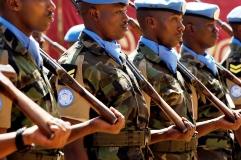UN and African Union close to deal on Darfur troops
June 6, 2007 (UNITED NATIONS) — The United Nations and the African Union reached tentative agreement on Wednesday on a 23,000-strong peacekeeping force for Darfur by glossing over a a dispute on who controls the operation.
 The deal, contained in a report to the U.N. Security Council, still has to be endorsed by the African Union’s Peace and Security Committee as well as the council and has been forwarded to Sudan for its approval.
The deal, contained in a report to the U.N. Security Council, still has to be endorsed by the African Union’s Peace and Security Committee as well as the council and has been forwarded to Sudan for its approval.
Full deployment of the force is not expected until next year, U.N. officials said.
At issue is who should have ultimate control of the expanded peacekeeping mission, known as a “hybrid” force for the expanded peacekeeping mission to bolster the beleaguered 7,000 African Union troops now in Darfur. Khartoum has insisted the force be under AU command but U.N. members cover its cost.
While the United Nations has agreed to African commanders, its proposal said more clarity was needed on command and control, as demanded by U.N. troop contributors and U.N. financial bodies. Another document is expected in this regard.
The new paper added language from a document agreed by all sides in November, saying “backstopping and control structures” would be provided by the United Nations. But it softened language referring to U.N. command and control.
“You will see that there are some modulations, but we will have to take it up in the consultations to see whether that is command and control as we see it,” said Johan Verbeke, Belgium’s U.N. ambassador, who is this month’s president of the Security Council.
In practice, a senior U.N. official said day to day operations would be managed by the African Union, but the United Nations could intervene if it disagrees.
“This is not easy. It is something new for both organizations,” the senior U.N. officials said in a briefing to reporters.
SANCTIONS?
The new revisions have now been approved by Alpha Oumar Konare, chairman of the African Union Commission, the secretariat of the 53-nation body, and U.N. Secretary-General Ban Ki-moon, according to a letter from Ban.
Sudanese President Omar Hassan al-Bashir has agreed in principle to a three-phase U.N. plan to strengthen the African troops. But he had delayed for five months acceptance of plans for the second stage of 3,000 military and police personnel.
There are concerns that Khartoum will again drag its feet on the large force, hence the United States and Britain are considering sanctions following U.S. unilateral penalties toward Sudan.
Introducing a sanctions resolution would also depend on access of humanitarian groups and other developments in Darfur, a region in Sudan’s West the size of France where experts estimate 200,000 people have died and more than 2 million expelled from their homes in the last four years.
But at this point, council diplomats say there is no majority in the 15-member body for additional sanctions. Council ambassadors intend to talk to Bashir on June 17, during their week’s tour to five African nations.
The measures under consideration are an arms embargo over the entire country, the monitoring of flights at Sudanese airports and a total prohibition of military flights over Darfur. The two nations also seek to add names to the list of four individuals now subject to financial and travel bans.
Non-Arab rebels took up arms in Darfur in early 2003, accusing the government of not heeding their plight. Khartoum armed some Arab militia, known as Janjaweed, who raped, killed and pillaged.
In the last year both Arab and non-Arab tribes have been fighting among themselves, shattering an earlier peace accord.
(Reuters)
